Climate change

I’ve believed that climate change is the greatest moral issue facing us, and something I want to work on in my congregation. But how? I asked someone who had conducted a survey in our denomination, and he said that most churches discussed the issue but had little or no concrete action. I talked to activist congregations whose members were experiencing burnout and no longer meeting as a group. In a meeting with concerned congregations, I found that they experienced a big separation between climate-change interest groups and social action groups. In my congregation, we formed a “Green Team” that was concerned with saving energy, but it was reluctant to do any political action.
After much prayer and many conversations and group meetings, our Social Justice Minister called a group together that he called “The Climate Change Initiative.” Twenty-five of us showed up, and after we introduced ourselves, our minister said he had noticed three groupings emerging: Practical, Political, and Spiritual Action.
We started to meet in three subgroups, but still collaborated. A year later, I met a leader of a United Church of Christ congregation who had pioneered and formed the UCC national denominational emphasis. She said the same three elements were evident in their congregation work, and that had, she thought, contributed to the pattern for change.
An overwhelming 97.1 percent of peer-reviewed papers in scientific journals agree that climate change is caused by humans. This finding can be used as a rebuttal against those who believe the scientific community is still debating the causes of climate change. Public opinion is still mixed with only 42 percent agreeing that human activity is the main cause of climate change. The Guardian reports:
"Our findings prove that there is a strong scientific agreement about the cause of climate change, despite public perceptions to the contrary," said John Cook of the University of Queensland, who led the survey.
Read more here.
The residents of Newtok, Alaska could see their village washed away within five years, making them the first American climate refugees. Newtok is surrounded by the Ninglick River, which continues to carry off 100ft or more of land each year. The highest point in the village could be underwater by 2017. The small community of 350 will be scattered across Alaska, with Newtok ceasing to exist. The Guardian reports:
"The snow comes in a different timing now. The snow disappears way late. That is making the geese come at the wrong time. Now they are starting to lay their eggs when there is still snow and ice and we can't go and pick them," Tom said. "It's changing a lot. It's real, global warming, it's real."
Read more here.
A recent study by biologists and climate researchers finds 57% of plants and 34% of animals will see their habitats cut by 50% or more by 2080. At the current rate worldwide temperatures are expected to rise 7 degrees by 2100. This change will make habitats in sub-Saharan Africa, Central America, Amazonia and Australia unsuitable for animals and plants. USA Today reports:
"The terrifying loss of biodiversity predicted by this study shows that climate chaos will fundamentally transform our planet," Shaye Wolf of the Center for Biological Diversity, a conservation group, says in a statement on the study. "We need to cut emissions now, before our ecosystems suffer catastrophic damage."
Read more here.
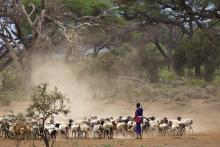
We have come to Kenya to hear our brothers and sisters bear witness to the ways environmental degradation and recent changes in the climate are harming them. Their testimony is disturbing and compelling. We are privileged to hear their stories, and honored by their trust in us as bearers of the message that they and their land, water, and air are suffering. Their words are a painful reminder of the brokenness of our world.
It is the most vulnerable in our world who suffer primarily and predominately from climate and other environment-related problems. While here, we are reminded that it is the poor who are affected first of all, and most of all, by these problems. The loss of one season’s crop can be catastrophic for those who live on the margins. Today, we are looking at massive dislocations in the ecosystems which sustain our world and all the life on it. Of these dislocations, the world’s poorest bear the brunt.
The U.S. climate change envoy proposed allowing countries to create their emissions reduction plans rather than working toward one goal. The U.S. hopes to bring more countries to the table and energize U.N. climate negotiations. The Guardian reports:
"Countries, knowing that they will be subject to the scrutiny of everybody else, will be urged to put something down they feel they can defend and that they feel is strong," Stern said from Berlin during a summit of environmental ministers focused on ways to advance the UN climate talks.
Read more here.
A study published May 1 from two researchers at the University of Pittsburgh and the University of Colorado found the widespread belief in "end-times" and the "Second coming" of Christ could impact the environmental policy movement negatively. The Huffington Post reports:
A belief in the Second Coming reduces the probability of strongly agreeing that the government should take action by more than 12 percent. In a corresponding manner, a belief in the Second Coming increases the probability of disagreeing with government action to curb global warming by more than 10 percent.
Read more here.
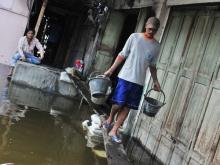
If you are reading this and are from North America — and perhaps even if you aren't — you are no doubt aware of just how divisive the issue of climate change is in the US and Canada. Experts from both sides of the issue are regular installments on the 24-hour news networks, presenting the latest data in favor of or disputing the warming of the planet. Policy experts offer the pros and cons of legislation aimed at cutting greenhouse gas emissions. Law makers debate possible action steps. Facebook posts supporting or refuting climate change turn into hotbeds of political (and sometimes a little bit of personal) attacks. Friends bicker; family relationships are strained.
This is simply the reality of the political climate in North America, but the existence of such rigorous debate is no coincidence. If warming trends continue the way that scientists are currently projecting (four degrees celsius by the end of the century), things in North America won't look all that different. We'll probably experience more droughts, our growing zones will shift, and Michigan will have the climate of Tennessee. Even if things do get bad in North America, we have the money and technology necessary to adapt fairly well to any changes in weather patterns or growing seasons that we might experience. In short: North America can afford not to worry about climate change — at least for a while.
A NASA led study found climate change may increase rainfall in some areas and drought in other areas. The study predicts for every 1 degree Fahrenheit increase in global average temperature, heavy rainfall will increase globally by 3.9%. The Los Angeles Times reports.
"These results in many ways are the worst of all possible worlds," said Peter Gleick, a climatologist and water expert who is president of the Pacific Institute, an Oakland research organization. "Wet areas will get wetter and dry areas will get drier."
Read more here.
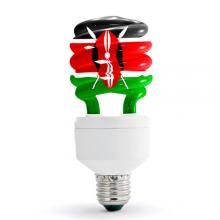
Is there anything more important to us than the air we take into our lungs every few seconds? The water that keeps us and all living things going? The soil that roots our food and our communities? Or the weather patterns that knit these elements all together?
What happens when these things begin to deteriorate — or rapidly change their behavior?
That is why I’m in Kenya with Cal DeWitt — well known Christian environmental scientist and teacher — and a group of eight others from the US and Canada: scientists, teachers, activists, and a film-maker.

If Congress passes immigration reform, much of the credit will be given to the broad and diverse voices that have lined up in support of fixing our nation’s broken immigration system. Both the labor and business community have been instrumental in moving legislation forward, while the evangelical community’s call to “welcome the stranger” has received significant attention by politicians and the media. The coalition of supporters continues to grow, as last week the Sierra Club, the oldest environmental organization in the country, announced its support for immigration reform.
Why would an environmental organization get involved with immigration reform? What could they possibly have at stake?
A lot.

A pipeline that will run from Canada, through the Midwest, and down to the Gulf Coast, the purpose of Keystone is to transport tar sands oil, which is more toxic than conventional oil, to ports where it can be processed and shipped overseas. In fact, the only oil that is guaranteed to stay in the U.S. is what will be spilled in communities and on farmlands. We saw this happen recently when a similar pipeline spilled in Arkansas. And, as for the promise of jobs, independent studies say fewer than 50 permanent jobs will be created by this project. Keystone is a deal in which America gets all the risk without any reward.
It's time for our leaders to take a stand and to stop supporting projects that only perpetuate our dependence on toxic, dirty sources of energy that contribute to climate change. But in the world of politics, it's not enough for something to be a moral imperative to get people to act. It is the nature of politics, and democracy, that our leaders respond when they feel the political pressure to do so. As people of faith, we have a powerful voice in our country. Keystone would not have been an issue in the Massachusetts Senate race if local religious communities had not made it clear that it is important.

Have you ever heard someone described as, “So heavenly minded, he was no earthly good?” This phrase suggests one danger of interpreting the book of Revelation. Sadly, when it comes to considering the natural world and Revelation, heavenly mindedness often undermines care for our environment. Some Christians have a tendency to think, “Well, if I’m off to heaven, I shouldn’t care much about this silly earth of ours. It’s just a temporary home, after all.”
In fact, Revelation suggests the opposite: the earth isn’t truly “left behind,” but renewed, becoming the very dwelling place of God. Revelation 21 calls people to be, well, “earthly good,” caring for creation as we prepare for God to come home.
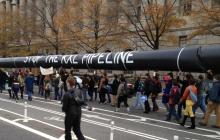
In the midst of our celebration of Earth Day, government agencies continued the debate over the Keystone XL Pipeline, which would transport oil from Canada’s tar sands across the United States into the gulf coast of Texas to be refined and shipped elsewhere. The State Department, tasked with reviewing the pipeline’s environmental impact, gave it a tentative pass a month and a half ago.
Activists across the country sprang into action to oppose the pipeline, citing its contribution to climate change and risk of oil spills. Supporters of the pipeline shot back, denying the climate impact of the pipeline and claiming that the oil would be produced whether or not the Keystone project moved forward.
The Environmental Protection Agency responded yesterday, calling into question the State Department’s findings and echoing the concerns of environmental activists everywhere: the Keystone Pipeline would be greatly exacerbate climate change.
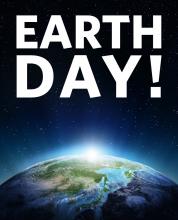
Today is Earth day! More than 1 billion people in 192 countries are participating in Earth Day festivities, which means there must be some good videos out there on the Internet commemorating this occasion, right? Right. So here are the five of our favorites videos — in no particular order — celebrating the Earth and the day designated for it.
1. Where did Earth Day come from? Get some info about Earth Day.

Unfortunately, Earth Day is rarely celebrated within mainstream Christianity beyond a Sunday sermon, and environmentalism is often frowned upon by evangelical leaders instead of championed. Here are the main reasons Christians have rejected caring for our environment.
Resources to help you join the battle to stop the construction of the Keystone XL pipeline
With its earth roof, straw bale walls, and cordwood construction, Woodhaven is a beauty to behold. Linda and Scot DeGraf’s handmade, ecofriendly home in West Virginia is featured in “Built to Last,” in the May 2013 issue of Sojourners magazine. Read their story of how they not only built a sustainable home, but also built community along the way.
While many people continue to believe there is no climate crisis, those most affected by global warming—particularly in the global South—know otherwise. According to Sojourners magazine’s interview with Malawi activist Victor Mughogho, the “impacts are quite severe on the ground.”
